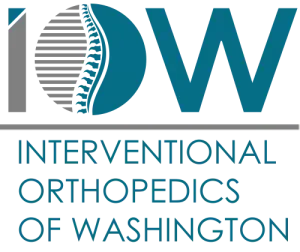Follow Us:
Open Hours
Tues - Fri 8:30 AM to 5:00 PM
Specialties
Herniated Disc
A herniated or bulging vertebral disc in your spine can contribute to pain and limit your mobility. Otoño Silva, MD, founder of Interventional Orthopedics of Washington in Bellevue, Washington, gets to the root of your pain and disability with supportive and regenerative therapies that help herniated discs heal themselves. If you want relief from a degenerative or herniated disc, contact Dr. Silva and the Interventional Orthopedics of Washington team by phone or by using the “Book Appointment” button.
Can’t find your condition on the list?
You might be a candidate. Schedule your free discovery call and let’s explore your options.
Herniated Disc Q&A
What’s a herniated disc?
Between each set of vertebral bones in your spine is a soft, cushiony tissue known as a vertebral disc. The discs resemble jelly doughnuts — they’re made of a soft gel-like substance encased in harder tissue. Your vertebral discs are your spine’s shock absorbers, allowing you to flex, twist, and move your spine freely and without pain.
When the outer casing of the disc is torn due to an injury or illness, the jellylike interior can push through to the exterior and brush against or press on sensitive nerves. A herniated disc also is less effective at protecting other structures in your spine. Your facet joints can become stressed, causing pain, inflammation, and this can eventually affect nerves and muscles in the spine.
You’re most likely to develop a degenerative disc in your cervical spine (neck) or lumbar spine (lower back). However, any disc along your spine can degenerate.
What are the risk factors for herniated discs?
You’re more likely to develop a herniated disc as you age, because your discs become thinner and drier, making them more susceptible to injury. Other risk factors include:
- Being overweight
- Not getting enough exercise
- Repetitive motions of the spine
- Engaging in sports or high-impact activities
- Trauma
- Poor posture
Smoking and overuse of alcohol can also degrade your discs.
What does a herniated disc feel like?
Despite the dramatic changes that a disc undergoes when it begins to herniate, you might not feel any symptoms at first. The most common symptoms of herniated discs include:
- Neck pain
- Shoulder pain
- Arm pain
- Lower back pain
- Buttock pain
- Sciatica (Pain that radiates down the legs)
- Weakness in limbs
- Tingling or numbness in limbs
If you suspect you have a slipped disc or have pain in your back or limbs, Dr. Silva determines the source of your pain and helps you heal the disc using supportive and regenerative therapies.
How does an interventional orthopedist treat a herniated disc?
Dr. Silva views your body as a sophisticated machine whose parts all affect one another. Based on your individual needs, he helps your body heal a herniated disc with state-of-the-art therapies like:
- Prolotherapy
- Platelet-rich plasma (PRP) treatments
- Cellular Therapy treatments
To get relief from the pain, numbness, or disability from a herniated disc, contact the helpful team at Interventional Orthopedics of Washington by phone or using the online request form.
Ready to get better?
Book Your Consultation Now

Interventional Orthopedics of Washington
Fax: (425) 326-1667
Clinic Hours
Open:
Tues – Fri 8:30am to 5pm
Closed:
Sat, Sun, Mon
